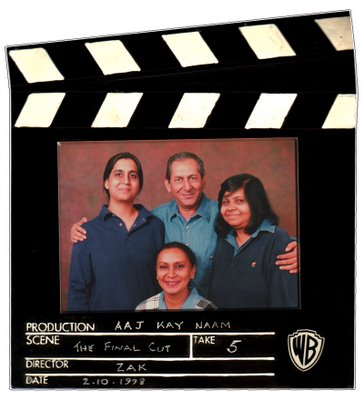Wednesday, October 29, 2008
Friday, October 17, 2008
To readers of Part 1 of An Uncanny Tale
I had no idea so many people would find interesting the long preamble to a 3-part series that I am primarily writing for my daughter and my 'acquired' family :-) Thank you for your appreciative comments and emails.
Many of you wrote to say I should post the next episode ASAP. Yaar, it takes time! Digging through the mind's vaults is easy ... the items really worth recalling shout out and beckon you ... but hunting through the physical jumble (and Nuzhat will be the first to state that it is one helluva jumble) of old albums and papers is a major chore. Then there's the scanning and cleaning up.
Writing a 'personal history' is also fraught with numerous problems for a non-writer such as I. Many episodes and happenings over the years have taken on a life of their own and developed into important (for me) separate strands ... and I have no idea how to get them all down into one comprehensive text. Maybe I should have taken Kamila's course at T2F, but I was broke.
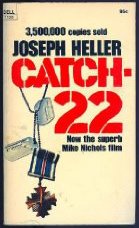
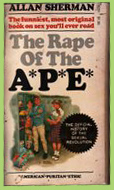 Joseph Heller solved the problem in one of my 2 most favourite books of all time, Catch-22, by throwing linearity out of the window. (The other book is Alan Sherman's The Rape of the A.P.E.. And just in case you are wondering why I'd enjoy reading some kind of perverted book about forced sex with our closely related primates, A.P.E. stands for American Puritan Ethic.)
Kurt Vonnegut developed a system I still find incomprehensible: Some of his characters flow in and out of different unconnected novels, often even cross-referencing episodes that keep me wondering about the chronological order of the writings. The oddest character in his books is Kilgore Trout, who writes cheap pulp Sci-Fi. In order to make this character more plausible than any fictitious character I have ever encountered, Vonnegut even wrote a cheap pulp Sci-Fi novel, Venus on the Half-Shell, publishing it under the name of that character. Crazy, no?
Joseph Heller solved the problem in one of my 2 most favourite books of all time, Catch-22, by throwing linearity out of the window. (The other book is Alan Sherman's The Rape of the A.P.E.. And just in case you are wondering why I'd enjoy reading some kind of perverted book about forced sex with our closely related primates, A.P.E. stands for American Puritan Ethic.)
Kurt Vonnegut developed a system I still find incomprehensible: Some of his characters flow in and out of different unconnected novels, often even cross-referencing episodes that keep me wondering about the chronological order of the writings. The oddest character in his books is Kilgore Trout, who writes cheap pulp Sci-Fi. In order to make this character more plausible than any fictitious character I have ever encountered, Vonnegut even wrote a cheap pulp Sci-Fi novel, Venus on the Half-Shell, publishing it under the name of that character. Crazy, no?
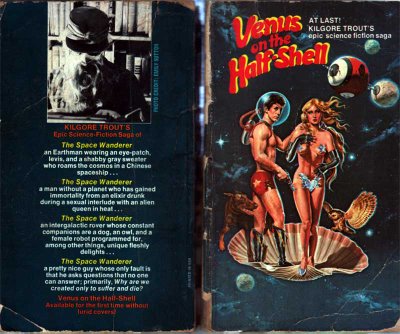 Tolstoy devised, I am told, a system that was similar to the now ubiquitous PostIts, keeping a careful record, while writing War & Peace, of where in each chapter each character figured and how that person's tale was developing. Story has it that one of the notes relating to a character who dies in an early chapter got mixed up and, so, he accidently comes back in another chapter. I can't vouch for this as I never did manage to get through the novel (it usually takes longer to read than the actual war lasted).
Blogs, with their cross-linking ability, do offer a delightful solution, but getting the Posts into a print edition, as some of you have suggested, is further complicated. However I am working on a solution.
I guess the reason some of you wanted me to post the next part quickly was to get to the end of the tale I'd labeled 'uncanny', thereby suggesting that some sort of 'twist' would follow. While I can understand the pressures of your curiosity, in order to make sense and contextualize the elements - in An Uncanny Tale / Part 2, which I will try and post a week from now - I will need to talk about 1947, skim through 1948 to 1965, hop to 1982-83, then take a long leap, directly to the end of last year.
Bear with me.
Tolstoy devised, I am told, a system that was similar to the now ubiquitous PostIts, keeping a careful record, while writing War & Peace, of where in each chapter each character figured and how that person's tale was developing. Story has it that one of the notes relating to a character who dies in an early chapter got mixed up and, so, he accidently comes back in another chapter. I can't vouch for this as I never did manage to get through the novel (it usually takes longer to read than the actual war lasted).
Blogs, with their cross-linking ability, do offer a delightful solution, but getting the Posts into a print edition, as some of you have suggested, is further complicated. However I am working on a solution.
I guess the reason some of you wanted me to post the next part quickly was to get to the end of the tale I'd labeled 'uncanny', thereby suggesting that some sort of 'twist' would follow. While I can understand the pressures of your curiosity, in order to make sense and contextualize the elements - in An Uncanny Tale / Part 2, which I will try and post a week from now - I will need to talk about 1947, skim through 1948 to 1965, hop to 1982-83, then take a long leap, directly to the end of last year.
Bear with me.
Monday, October 13, 2008
Sheer Magic
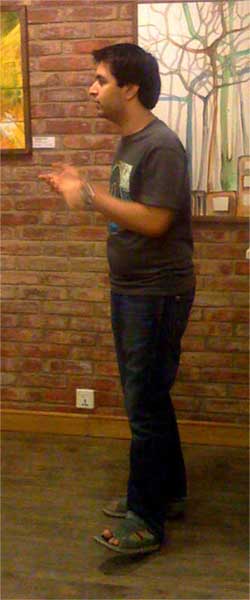
Labels: Apple, Events, Media, News, Pakistan, Reviews, Science, T2F, Technology
Sunday, October 12, 2008
India 3: An uncanny tale ... (Part 1 — The Rather Long Preamble)
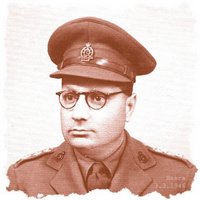 Rewind to late-1944 to 1945 (give or take 6 months ... for I am just guessing). The Second World War is in full swing. My father, a doctor, has had to enroll in the Army. The three of us - Abi, Ummi, and I - are constantly on the move from camp to camp.
Abi's short postings take us into cantonments from Jhansi to Campbellpur - places now in two different countries but made famous by their queens - and several others towns I can only vaguely recall. For some details, however, my memory is almost photographic: I can recall every face at our table - even the orange floral pattern on the sari Ummi was wearing - when the cook, Salamat, came running in to warn us that Sultana Daku was about to attack. Of course, like most things associated with Salamat, it turned out to be a figment of his opium-inspired imagination. I guess why I haven't forgotten the incident is because I have been forever chided for asking "Will he sign my autograph book?"
I am 4+ years old and always the only child at all of these places, as far as I can recall. (Wish I had asked my parents why that was so ... for it does seem odd to me now.) This lack of peers makes me spend most of my time around the same things that the grown-ups around me enjoy: books, magazines, music, poetry ... and sitting with them, trying to make sense of their discussions.
Travelling with us everywhere, among Abi's uniforms, Ummi's saris & ghararaas, my favourite embroidered chikan kurtaas (and my own uniform) is my box of Meccanos #0/#1 and a small crate of Abi-Ummi's books.
Rewind to late-1944 to 1945 (give or take 6 months ... for I am just guessing). The Second World War is in full swing. My father, a doctor, has had to enroll in the Army. The three of us - Abi, Ummi, and I - are constantly on the move from camp to camp.
Abi's short postings take us into cantonments from Jhansi to Campbellpur - places now in two different countries but made famous by their queens - and several others towns I can only vaguely recall. For some details, however, my memory is almost photographic: I can recall every face at our table - even the orange floral pattern on the sari Ummi was wearing - when the cook, Salamat, came running in to warn us that Sultana Daku was about to attack. Of course, like most things associated with Salamat, it turned out to be a figment of his opium-inspired imagination. I guess why I haven't forgotten the incident is because I have been forever chided for asking "Will he sign my autograph book?"
I am 4+ years old and always the only child at all of these places, as far as I can recall. (Wish I had asked my parents why that was so ... for it does seem odd to me now.) This lack of peers makes me spend most of my time around the same things that the grown-ups around me enjoy: books, magazines, music, poetry ... and sitting with them, trying to make sense of their discussions.
Travelling with us everywhere, among Abi's uniforms, Ummi's saris & ghararaas, my favourite embroidered chikan kurtaas (and my own uniform) is my box of Meccanos #0/#1 and a small crate of Abi-Ummi's books. 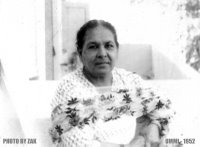 Apart from Ummi's stack of Ismat issues and Kohé Qaaf Kay Peechhay - a book of children's stories from which she read to me - I can recall 4 of them even 60+ years later: There is a Deevaané Ghalib, for which my mother has made a slipcase in papier-maché and decorated with dried leaves. On one large leaf is her attempt at a pen-sketch of Ghalib that she is very proud of, until one of Abi's colleagues assumes the sketch to be Jesus. (He thinks the book is an Urdu translation of the Bible and is being kept, like Qurãns, in a jüzdaan). The other books are Palgrave's Golden Treasury, Feroze-ul-Lughaat (Farsi), and a Platts' Dictionary that was gifted to Abi by someone at one of the camps. The latter 2 are still with me :-)
My lifelong habit of travelling heavy is obviously inherited from my parents, for there is also another 'essential' and much cared-for set of items that weigh a ton and go everywhere with us: A black trunk that contains an HMV wind-up gramophone and a small music 'collection' (78 RPM records), neatly stored in 2 metal boxes, painted dark green. Inscribed on them in white paint: WEST; EAST. The first holds some records by Caruso, Gigli, Chaliapain, McCormack, and Debussy's Claire De Lune by someone. Imagine how often I must have heard all these names to be familiar with them at that age! The second, a bigger box, is populated by our own classical music's demi-gods: Fayyaz Khan, Karim Khan, Bai Kesarbai, Omkarnath Thakur, Enayat Khan. It also has a thin balsa wood partition that keeps these giants segregated from mere mortals who sing "light pieces": K. L. Saigal*, Akhtari Bai, Kamla Jharia. There's even a Talat Mahmood (his very first: Sab Din Ayk Samaan Naheeñ Tha) - included, I suspect, more because of Abi's almost-paternal love for his younger cousin than for the song. (Ummi enjoyed the song, but it just wasn't on my father's musical hot-list ... although he got all teary-eyed and mushy whenever we played it!)
At one or two camps, where we stayed relatively longer, Abi made friends with a few people equally interested in English literature, Urdu shaaeri, and music. The well-known humourist, Dr. Shafiq-ur-Rahman, was my father's junior at one camp and was always a barrel of fun when he came over, with my mother and others teasing him about some new nurse or the other he would fall for on a fortnightly basis. (This, I narrate not as much from memory as from tales retold.) Shafiq chacha and my father had everyone rolling with laughter as they used crazy words, such as Posheedah Ghünchee for Chhipkalee). There were humourous verses, too, a few of which, including a ghazal with a funny qaafiah ("ch, ch" = "tsk, tsk" - by Abi) appear in Shafiq Chacha's book, Lahrayñ. This scanned image of three of its couplets is from Abi's bayaaz.
Apart from Ummi's stack of Ismat issues and Kohé Qaaf Kay Peechhay - a book of children's stories from which she read to me - I can recall 4 of them even 60+ years later: There is a Deevaané Ghalib, for which my mother has made a slipcase in papier-maché and decorated with dried leaves. On one large leaf is her attempt at a pen-sketch of Ghalib that she is very proud of, until one of Abi's colleagues assumes the sketch to be Jesus. (He thinks the book is an Urdu translation of the Bible and is being kept, like Qurãns, in a jüzdaan). The other books are Palgrave's Golden Treasury, Feroze-ul-Lughaat (Farsi), and a Platts' Dictionary that was gifted to Abi by someone at one of the camps. The latter 2 are still with me :-)
My lifelong habit of travelling heavy is obviously inherited from my parents, for there is also another 'essential' and much cared-for set of items that weigh a ton and go everywhere with us: A black trunk that contains an HMV wind-up gramophone and a small music 'collection' (78 RPM records), neatly stored in 2 metal boxes, painted dark green. Inscribed on them in white paint: WEST; EAST. The first holds some records by Caruso, Gigli, Chaliapain, McCormack, and Debussy's Claire De Lune by someone. Imagine how often I must have heard all these names to be familiar with them at that age! The second, a bigger box, is populated by our own classical music's demi-gods: Fayyaz Khan, Karim Khan, Bai Kesarbai, Omkarnath Thakur, Enayat Khan. It also has a thin balsa wood partition that keeps these giants segregated from mere mortals who sing "light pieces": K. L. Saigal*, Akhtari Bai, Kamla Jharia. There's even a Talat Mahmood (his very first: Sab Din Ayk Samaan Naheeñ Tha) - included, I suspect, more because of Abi's almost-paternal love for his younger cousin than for the song. (Ummi enjoyed the song, but it just wasn't on my father's musical hot-list ... although he got all teary-eyed and mushy whenever we played it!)
At one or two camps, where we stayed relatively longer, Abi made friends with a few people equally interested in English literature, Urdu shaaeri, and music. The well-known humourist, Dr. Shafiq-ur-Rahman, was my father's junior at one camp and was always a barrel of fun when he came over, with my mother and others teasing him about some new nurse or the other he would fall for on a fortnightly basis. (This, I narrate not as much from memory as from tales retold.) Shafiq chacha and my father had everyone rolling with laughter as they used crazy words, such as Posheedah Ghünchee for Chhipkalee). There were humourous verses, too, a few of which, including a ghazal with a funny qaafiah ("ch, ch" = "tsk, tsk" - by Abi) appear in Shafiq Chacha's book, Lahrayñ. This scanned image of three of its couplets is from Abi's bayaaz.
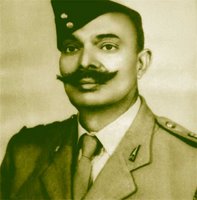 Three other people who stayed in touch over the years were Khan Chacha, Badshah Chacha, & Gupta Chacha. The first two came to Pakistan and our family ties continued beyond their deaths and those of my father and mother. Sadly, Badshah Chacha (whose eldest son laughingly claims to have been conceived at our house) died very early. Khan Chacha was around for quite a while and continued visiting Ummi and me regularly after my father passed away in 1963. Despite the fact that these two chachaas were part of my life as I grew up in Karachi - and were extremely affectionate and caring - it was "Gupta Cha", left behind in India, whom I inexplicably missed most.
Fast Forward: It's January 1946. The war has been over for months. We are in Delhi, where Abi has rented a space and set up a small clinic, which he hopes to expand. He has asked for a release from the Army and is waiting for it to arrive. Ummi is busy all day, putting together crockery and stationery, even embroidering a floral K on new bed-sheets and pillow-covers for the 2-bed 'overnight hospital' they hope to build in the small space behind the clinic some day.
Our flat above the clinic is small but frequently filled with poets and writers, because Abi is the Joint Secretary of Anjumané Taraqqiyé Urdu. (The other 'joint' being a young Jamiluddin Aali). I have vague memories of Ustaads like Jigar and Seemaab on one or two occasions and a clearer one - from what may have been the last week in that house - of a very young Habib Jalib, whom I remember because of his beautiful voice, long hair, and the super-shiny :-) white sharkskin shervaani.
We are just beginning to settle down but Abi is suddenly asked to report for another year and is shunted off to medical camps in Baghdad, Cairo, and Jerusalem. Keen on Biblical History - it is from him, again, that I get my passion for it - these postings thrill him as he visits hundreds of legendary sites. Take a look at a picture of Jesus's traditionally claimed birthplace from Abi's album.
Abi even visits Karachi during his to-ing and fro-ing and is impressed by what was then a lovely, friendly and exremely clean city. Here's a view that I also found in his album of Elphinstone Street (now Zebunnisaa Street, named - oddly, methinks - after the daughter that King Aurangzeb kept imprisoned for years***). Times change! The city has changed in every conceivable and inconceivable way, but I still love it, madly!
The air in our Dilli house is beginning to fill with the talk of Pakistan. My mother's cousin, Ziauddin Kirmani (ZDK) is constantly heard arguing for the Muslim League, while my father and a few of his politically active Congress-supporting friends argue for a united India.
Three other people who stayed in touch over the years were Khan Chacha, Badshah Chacha, & Gupta Chacha. The first two came to Pakistan and our family ties continued beyond their deaths and those of my father and mother. Sadly, Badshah Chacha (whose eldest son laughingly claims to have been conceived at our house) died very early. Khan Chacha was around for quite a while and continued visiting Ummi and me regularly after my father passed away in 1963. Despite the fact that these two chachaas were part of my life as I grew up in Karachi - and were extremely affectionate and caring - it was "Gupta Cha", left behind in India, whom I inexplicably missed most.
Fast Forward: It's January 1946. The war has been over for months. We are in Delhi, where Abi has rented a space and set up a small clinic, which he hopes to expand. He has asked for a release from the Army and is waiting for it to arrive. Ummi is busy all day, putting together crockery and stationery, even embroidering a floral K on new bed-sheets and pillow-covers for the 2-bed 'overnight hospital' they hope to build in the small space behind the clinic some day.
Our flat above the clinic is small but frequently filled with poets and writers, because Abi is the Joint Secretary of Anjumané Taraqqiyé Urdu. (The other 'joint' being a young Jamiluddin Aali). I have vague memories of Ustaads like Jigar and Seemaab on one or two occasions and a clearer one - from what may have been the last week in that house - of a very young Habib Jalib, whom I remember because of his beautiful voice, long hair, and the super-shiny :-) white sharkskin shervaani.
We are just beginning to settle down but Abi is suddenly asked to report for another year and is shunted off to medical camps in Baghdad, Cairo, and Jerusalem. Keen on Biblical History - it is from him, again, that I get my passion for it - these postings thrill him as he visits hundreds of legendary sites. Take a look at a picture of Jesus's traditionally claimed birthplace from Abi's album.
Abi even visits Karachi during his to-ing and fro-ing and is impressed by what was then a lovely, friendly and exremely clean city. Here's a view that I also found in his album of Elphinstone Street (now Zebunnisaa Street, named - oddly, methinks - after the daughter that King Aurangzeb kept imprisoned for years***). Times change! The city has changed in every conceivable and inconceivable way, but I still love it, madly!
The air in our Dilli house is beginning to fill with the talk of Pakistan. My mother's cousin, Ziauddin Kirmani (ZDK) is constantly heard arguing for the Muslim League, while my father and a few of his politically active Congress-supporting friends argue for a united India.
Interesting factoid: ZDK edited and published, from Lucknow, a paper called Pakistan ... well before the name was coined for this country. Later, he also authored a biography of the Prophet, The Last Messenger with a Lasting Message - An Unconventional Study (recently re-published by his son, Tariq, and available at T2F). I'd strongly recommend it to those looking for a fresh approach, interesting references related to early Islamic history, and succinct biographical sketches of the Prophet's contemporaries ... but I must warn readers that certain sects have been upset about a couple of portrayals. The book is intriguingly dedicated "to those who seek the truth and are prepared to face it".Soon, my father leaves for his new posting, packing Ummi and me off to to my maternal aunt in Calcutta, where her husband works for the Sea Customs. Also in Calcutta (now Kolkota) lives my paternal grandfather (of whom everyone I know is scared to death) ... more about him in some other post ... so it is a treat for all of us that my uncle is soon posted to Budge-Budge (now Baj-Baj), an oil pier 2o miles up the Hooghly. The distance from central Calcutta, though short, is mercifully not entirely conducive to my grandpa dropping in too frequently. 1947 arrives with bloodshed and riots in Calcutta, turning the Hooghly occasionally pink. My only playmate - Sattar, a family servant's child brought up by my aunt and just a bit older than I - spot a body or two floating up-river with the tide. We even have a rather gruesome encounter with a severed head, once. My uncle, Asad Ali, and his close friend and neighbour, Shaukat Chacha, are employed in the Sea Customs because of their hockey prowess. They talk each day about how close "we" are to attaining Pakistan. My uncle and aunt are extremely fond of me. They have no child of their own and are like my second-set of parents. I even call them Ammi Jaan and Abbu Jaan, titles generally used to address one's own parents. In contrast to my parents, they are such fanatical Muslim Leaguers, they even alter my name. Not legally, of course, thank goodness. But in my books and notepads I am made to write Mohammad Zaheer Alam Kidvai Jinnahi! One of these books I still own: It is Vol. 2 of Hafeez Jallandhari's Shaahnaamaé Islam, which I used to once recite full throatedly to anyone who'd listen, thrilled at the descriptions of the bloody battles and the 'heroic' deeds of the early Muslims. Until I grew up ... It's August 1947, now. Pakistan is a reality. Where we are is relatively safe but from conversations and the BBC news over the radio we hear that things are bad everywhere. Our family has to move out and head to Bombay from where we are to travel to Karachi, since Abbu Jan has 'opted' for West Pakistan. I suspect that the decision to not move to East Pakistan - so much closer to Calcutta and an obviously easier/safer move - was taken partly because my grandpa was migrating to Dhaka ;-) (Did I forget to tell you that my daada was also Abbu Jan's elder brother? Not too confusing a relationship, actually. Just a case of an uncle and a nephew, only 6 years apart, marrying 2 sisters!) Abi is to meet us in Bombay and take us 'home', to Delhi, while the others sail away to Karachi. I can hardly wait to get 'home'. The long journey takes us through three train changes and a circuitous route which, for the life of me, I cannot recall. On the last leg of the journey we are told that, now, there are riots everywhere and trains are being stopped and attacked. People are being killed by one or the other party, depending upon your religion and theirs, casting aside the veneers of pretense about professed humaneness and love that followers on both sides boast incessantly about in less challenging times. I guess in order to not scare me and 2 other slightly older kids in the compartments the elders don't talk about any of this much. Or about anything. Their silence - specially that of Ummi and Ammi Jan, generally non-stop talkers :-) seems eveb scarier to Sattar and me. At one station we have a surprise in store: A uniformed, beaming-as-always Gupta Cha bounds into the carriage and travels with us all the way to Bombay. At one point - when the train is stopped by a Hindu mob - he leans out of the window and announces that he and his large family travelling with him are Hindus and the only occupants of that compartment. Uniforms didn't get questioned, even then!
Allow me to digress, but this reminds me of a joke that became popular at the time of Ayub Khan's 1958 Martial Law. A man standing at the Indo-Pak border sees a horde of rabbits scurrying across to the Indian side from ours. He manages to stop and grab an old hobbling rabbit and asks him what they are running away from. Desperately trying to wiggle out of the man's grasp, the old rabbit says that the Pakistan Army has ordered the capture of all horses for its use. "But you're a rabbit", says the man. "Yeah. But ...", says the squirming rabbit, "have you ever tried to argue with a soldier?"The other family in the compartment, obviously Muslim (one of the women has been reading a small Qurãn which is hidden away each time the train stops) looks worried. Gupta Cha walks up to the old man among them and says something, then summons a railway guard and takes a brass T-shaped key from him and locks the door from inside. Silent glances are exchanged. One of the women starts to weep. Ummi walks over and sits with her for the rest of the overnight journey. We reach Bombay, safely. Or, at least half the train does. The second half has been de-linked in some ambush somewhere. I piece this together from hushed conversations. A lot of the luggage, too, is gone. Abbu Jan informs us that many compartments are chalk-marked 'MT'. I wonder for hours what 'MT' could mean, before realizing that he said 'empty'. My uncle and aunt lose nothing, though. All their stuff arrives safely, including their gramaphone and large record collection. Ummi has just a small trunk of clothes that's been in the carriage with us. I tow an empty army-issue bistarband ("because it's Abi's!") and a small but heavy trunk with a couple of toys, a plate that I cherish to this day (it's segmentation seemed almost satirical years later in the wake of the 3-way partition, so it got dubbed among us cousins, who often fought to eat in it, the Partition Plate), a few small books, and the latest Khilona magazine. There are also 3 records (wrapped safely in a towel): a children's song by someone about a Dahi ba∂ay vaali, Omkarnath Ji's Kedam kee chhaya, and Caruso's La donna è mobile (all of which I loved listening to, every opportunity I got, to the bemusement of my elders). Ummi and I are expecting to see all our stuff in Delhi, soon. I can't wait to get to our asli gramaphone, the one in our drawing room, with the huge golden horn ... and the strangely intriguing machine that Abi has inherited from his mother, one that plays music off amberol cylinders, of which we only have 4 (they are never touched, except when I plead really hard for listening to one of them). I am mesmerized as I hear and watch those cylinders that seem somehow more magical than the black records. We meet Abi and find out that the house in Qarol Bagh (now Karolbagh) has been looted and burnt. "My toys and the cylinders, too?", I ask, worried. But Ummi is now sobbing uncontrollably and no one is in the mood to answer my silly question. Soon, I cry, too, as Abi tells us more about the house. Although I am sure I did not really understand much, I do glean that our landlord, Rauf sahab, has been kidnapped and presumed killed. His wife - who was visiting someone else at that time - is missing.
Jump briefly to a scene ahead: 4 years later, we discover Mrs. Rauf in Karachi. Abi finds and recognizes her at a Police Station near Guru Mandir, where he is called "to sedate a mad woman". She had travelled across with other relations, we learn later from the people who come to 'claim' her back, and has gone raving mad over the years.)Abi tells us he has spoken with senior persons in the congress party, specially Dr. Syed Mahmud (Nuzhat's maternal grandfather), a close friend and associate of Pandit Nehru.
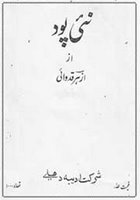 Naana Jaan (as we called him) was much loved an admired by Abi, who had dedicated his book of essays and stories - Naee Paod - a few years earlier to him in remembrance of the student days at Aligarh when Nana Jan was a greatly admired activist.
Everyone has advised that we head out to Pakistan and return 'once the dust has settled'. (Vazira Zamindar's excellent book, The Long Partition, indicates that not only did many feel this way but some, in fact, did return to their old homelands**). I am stumped today, as I think back, at the naivete of all the Congress and Muslim League leaders, none of whom seemed to have had any inkling of the level of tragedy that this act of separation - still debated within our own country (and criticized, without even an attempt at understanding the reasons, in India) - would assume.
(To be continued ...)
* If you want a link from where you can download a wonderful audio file of Naushad's recollections of Saigal (well worth hearing), email me.
**POSTSCRIPT: Added 19th October 8:00 AM
I just came across some comments by a Mr. Ali Dada (Ref: Oct 18, 6.04PM) on the ATP site where this post has been included by its editors. While I have responded to his other bits at that site, I do wish to clarify one thing here because - judging by his conclusion - I did not, obviously, come across clearly enough on this one point: My reference to 'going back' was not only about people who crossed this way going back to India but something that took place in both countries after partition. (Mr. Dada obviously did not notice that I had said "return to their old homelands".) In fact the process was also ‘officially supported’ for a while on both sides of the border. Newspaper ads and other evidence, including some stats, for this are offered in Ms Zamindar’s book.
*** Another update (October 22nd) as a result of a comment by Gopi on ATP - and also pointed out in two emails.
First, Gopi: ... Such an interesting piece. Incidenally, the Zaibunnissa Street in Karachi is named after Zaib-un-Nissa Hamidullah, the firebrand editor of the Mirror who gave such a hard time to Ayub Khan in the last years of his presidentship. She was an Anglo-Indian (Bengali father and British mother) but married into a Punjabi family. Check out [this].
My response on AT: @Gopi - Thanks for the Zaibunnisa 'correction'. I know that was what was proposed and has been recorded by many. However, when some people raised an objection to naming it after her and said that her friends and family had 'pulled strings' to have this done, the authorities responded by pulling Priness Zaibunnisa out of their hat :-) ... but I guess your version, since it is now supported by Wikipedia, stands.
Naana Jaan (as we called him) was much loved an admired by Abi, who had dedicated his book of essays and stories - Naee Paod - a few years earlier to him in remembrance of the student days at Aligarh when Nana Jan was a greatly admired activist.
Everyone has advised that we head out to Pakistan and return 'once the dust has settled'. (Vazira Zamindar's excellent book, The Long Partition, indicates that not only did many feel this way but some, in fact, did return to their old homelands**). I am stumped today, as I think back, at the naivete of all the Congress and Muslim League leaders, none of whom seemed to have had any inkling of the level of tragedy that this act of separation - still debated within our own country (and criticized, without even an attempt at understanding the reasons, in India) - would assume.
(To be continued ...)
* If you want a link from where you can download a wonderful audio file of Naushad's recollections of Saigal (well worth hearing), email me.
**POSTSCRIPT: Added 19th October 8:00 AM
I just came across some comments by a Mr. Ali Dada (Ref: Oct 18, 6.04PM) on the ATP site where this post has been included by its editors. While I have responded to his other bits at that site, I do wish to clarify one thing here because - judging by his conclusion - I did not, obviously, come across clearly enough on this one point: My reference to 'going back' was not only about people who crossed this way going back to India but something that took place in both countries after partition. (Mr. Dada obviously did not notice that I had said "return to their old homelands".) In fact the process was also ‘officially supported’ for a while on both sides of the border. Newspaper ads and other evidence, including some stats, for this are offered in Ms Zamindar’s book.
*** Another update (October 22nd) as a result of a comment by Gopi on ATP - and also pointed out in two emails.
First, Gopi: ... Such an interesting piece. Incidenally, the Zaibunnissa Street in Karachi is named after Zaib-un-Nissa Hamidullah, the firebrand editor of the Mirror who gave such a hard time to Ayub Khan in the last years of his presidentship. She was an Anglo-Indian (Bengali father and British mother) but married into a Punjabi family. Check out [this].
My response on AT: @Gopi - Thanks for the Zaibunnisa 'correction'. I know that was what was proposed and has been recorded by many. However, when some people raised an objection to naming it after her and said that her friends and family had 'pulled strings' to have this done, the authorities responded by pulling Priness Zaibunnisa out of their hat :-) ... but I guess your version, since it is now supported by Wikipedia, stands.
Labels: Books, Events, Music, Pakistan, People, Personal, Poetry, Urdu
Tuesday, October 07, 2008
Keep out of my mailbox, please ...
I am angered by spamming, in general, and usually write almost instantly back, in as rude terms as I can, demanding to be taken off the offending list and often suggesting where they can stick their products, if the size is right. Sometimes it works (I am referring to being taken off the list, not to the suggested action), though more often it doesn't ... there are too many persistently annoying bastards in this world. But it does help me get rid of my anger.
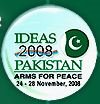 Today, some ass whom I do not know - and certainly do not wish to know - has sent me 'warm regards' (I wonder what he sends real friends, if he has any) and says he is looking forward to welcoming me "at 5th International Defence Exhibition & Seminar – IDEAS 2008!" As a pacifist I am even further offended at this particular spam, not just because it represents all that I detest but for promoting an event that has the loony tagline: Arms for Peace!
Today, some ass whom I do not know - and certainly do not wish to know - has sent me 'warm regards' (I wonder what he sends real friends, if he has any) and says he is looking forward to welcoming me "at 5th International Defence Exhibition & Seminar – IDEAS 2008!" As a pacifist I am even further offended at this particular spam, not just because it represents all that I detest but for promoting an event that has the loony tagline: Arms for Peace!Labels: Activism, Events, Media, Pakistan, People, Personal, Politics, Rant, Religion, Technology
Thursday, October 02, 2008
Ten years on!
Labels: Apple, Bloggers, Literature, Media, People, Personal, Poetry, Technology, Urdu
Full Circle
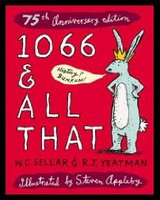 Around 40 years ago, a couple of years before we were married, I introduced Nuzhat to the Sellar & Yeatman classic, 1066 & All That - a book I had discovered in Abi's library and had spent hours ROTFL.
Around 40 years ago, a couple of years before we were married, I introduced Nuzhat to the Sellar & Yeatman classic, 1066 & All That - a book I had discovered in Abi's library and had spent hours ROTFL.
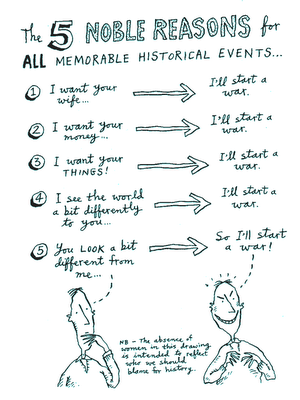
Labels: Books, Literature, Personal

